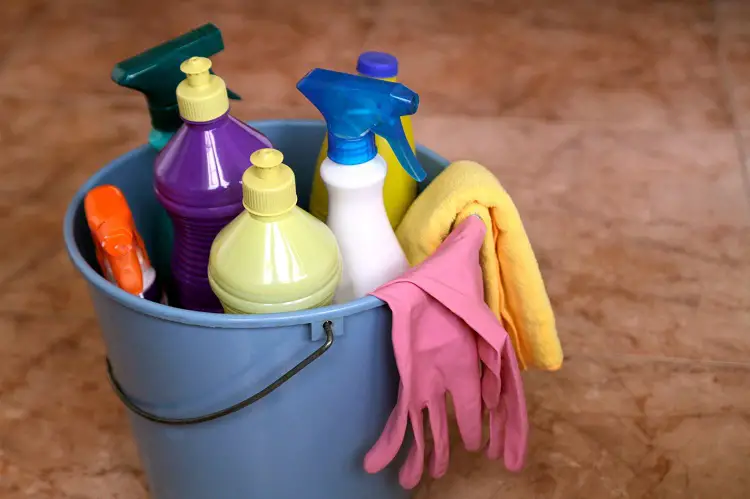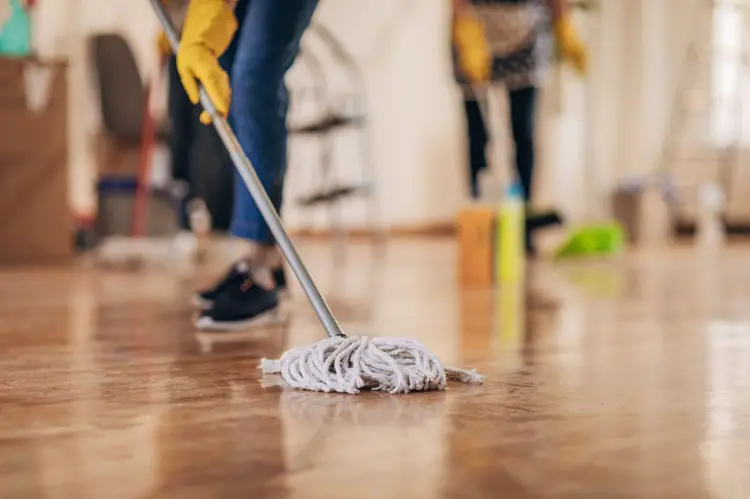Many people clean their vinyl floors by sweeping or vacuuming debris every day or two.
A damp mop or a Swiffer-like cleaning tool may accompany them every week.
Although these steps are important and beneficial, they are ineffective when removing stubborn odors and disinfecting the floor.
If you’re wondering how to clean vinyl floors with vinegar, you can safely and effectively get the results you need by mixing one cup of cider vinegar with a gallon of hot water.
Then use a damp mop, and clean the floor frequently with hot water from another bucket or sink. Mix the vinegar water with a few drops of liquid dishwashing soap for extra cleaning power.
To learn more, we discuss in detail how to clean vinyl floors with vinegar and other alternative ways to clean your floors if you don’t want to use vinegar.
Why Use Vinegar on Vinyl Floor?
Vinegar is primarily made of acetic acid and has a low pH rating. Since vinegar is highly acidic, it effectively kills microorganisms and bacteria on the floor.
It also has degreasing properties. Despite being the most acidic and effective vinegar, apple cider vinegar can achieve desired results when used on vinyl floors.
How to Clean Vinyl Floors with Vinegar
Before starting, you must learn how to clean vinyl floors with vinegar correctly.
As vinegar is an acidic substance, it can damage some surfaces in your home. It can erode and damage natural stone materials. Before you begin, ensure that the flooring is made of vinyl.
Following the proper steps can prevent your floor from unnecessary damage while disinfecting and deodorizing the surfaces while taking advantage of vinegar’s beneficial cleaning properties.
What You’ll Need
- Vacuum cleaner
- White vinegar
- Hot water
- Essential oil
- Mop cleaner
- Rubbing alcohol
Step 1: Vacuum or Sweep the Floor
Vinyl flooring has a soft, waxy topcoat that can easily damage dirt particles or other abrasives. Vacuuming or sweeping the floor will also enable you to clean the floor more thoroughly.
Remember that mopping may only remove some debris from the floor. If you don’t dust or sweep first, your mop may move some of these particles across the floor without removing them.
Removing floor mats, potted plants, chairs, and other items you can move can help make mopping easier.
Step 2: Gather Your Supplies
A cup of white vinegar diluted with a gallon of hot water is the most effective disinfectant, but it has a strong odor.
You can reduce the smell by adding a few drops of your favorite essential oil. Although Apple cider vinegar has a higher pH balance, it is still an effective cleaning agent.
Step 3: Mop the Vinyl Floors Strategically
You could use a two-bucket cleaning system, one with vinegar and hot water and the other with clean water.
Mop the floor with the vinegar-diluted solution in sections, then follow it up with a clean mop.
For the best result, pull the mop to you as you clean. Always replace the clean water as it gets dirtier to ensure you use clean water to rinse the vinegar solution.
Step 4: Tackle Stubborn Spots Carefully
Although vinegar is effective at disinfecting and deodorizing, it may not be effective when removing stains and scuffs.
For instance, you can spot clean scuffs with WD-40 or mild oil without damaging your wax topcoat with the product.
You can remove paint with mineral spirits. Baking soda and vinegar are effective in removing solid or food stains.
You can also use rubbing alcohol may remove makeup stains.
Alternatives Ways To Clean Vinyl Floors Without Using Vinegar

Now you’ve learned how to clean vinyl floors with vinegar; you can easily tackle those filthy floors in your home.
But what if you don’t have vinegar or vinegar doesn’t work for you? Don’t worry.
You can use these cleaning methods to clean your vinyl floors.
1. Use dish soap
You can use commercial floor cleaners to wash your vinyl floors, but it is a good idea to double-check the labels to ensure that the cleaners are vinyl-safe before using them.
Make a cleaning solution for vinyl floors with dish soap.
Common “mop and shine” or soap-based products leave a dull film on the floor, attracting dust and dirt throughout the week, precisely what we are trying to avoid.
So, mix warm water with a few drops of dish soap instead of using a cleaning product.
You will not have to buy extra cleaning products each month to complete this task since this simple cleaning solution will be strong enough to clean your floors effectively.
While using this method, you will need to rinse your floor afterward, or you risk leaving soap buildup on the vinyl floor.
2. Attack stains using baking soda
It is best to use baking soda to remove stains on the floor while cooking with red pasta sauce or when sipping red wine in the living room.
If you cannot wipe away the splotch fast enough and a dark stain has set into the vinyl floor, a paste consisting of 2 tablespoons of baking soda and 1 teaspoon of water will help fade the stain.
As you may know, baking soda is abrasive and can effectively remove stains from your floor without damaging the vinyl underneath.
If the stain refuses to go after the first trial, try again until the discoloration begins to fade.
Alternatively, use the paste to tackle dirt buildup since the baking soda will help break down that residue.
Once the stain is eliminated, use a clean, soft cloth to wipe away the baking soda.
3. Use baby oil
If you feel your vinyl flooring looks dull, give it a boost in shine by adding 3 to 5 drops of baby oil. Do not overdo it.
You can add a few drops to a gallon of warm water or add a cup of vinegar to the bucket to polish and disinfect the floor simultaneously.
Healthline states white vinegar is acidic and will dissolve any buildup on the floor. This could cause a dull sheen on the vinyl floor.
The baby oil, on the other hand, is a natural polish that will add an extra dose of shine to the vinyl after thoroughly cleaning it.
4. Use Dawn dish soap
You can remove grease from vinyl floors with Dawn dish soap if vinegar solution or dish soap mixture isn’t doing the job when cleaning the vinyl floors in your kitchen.
Dawn is excellent at cutting through grease in dirty pans, but it also works on vinyl floors.
According to Apartment Therapy, if the floor around your stove is tough to clean, fill a bucket with a gallon of warm water and a few drops of Dawn.
This will eliminate those tacky, stubborn spots and make cleaning much easier.
Just be careful not to use too much water on your cloth or mop, as this can damage your vinyl floors.
Excess moisture on the floor can seep under the vinyl and weaken glue bonds, causing the edges to lift and bubbles to form in the center.
Related Post:
- Can You Paint Electric Outlets? Explained
- Pine Sol Vs Bona (A Complete Buying Guide)
- Best Homemade Floor Cleaners for Hardwood Floors
- How Often Should You Dust and Vaccum Your House?
FAQs
Does vinegar damage vinyl floors?
Distilled white vinegar is a natural degreaser, disinfectant, and cleaner that can be used on virtually any surface, including vinyl floors.
White vinegar’s acidic compounds dissolve buildup and remove dirt without damaging the finish of your floor.
How do experts clean vinyl floors?
Professionals use specially formulated cleaning solutions and hot water extraction to clean vinyl floors.
Combining these methods results in a powerful vinyl floor cleaning action that restores the look of your vinyl flooring.
How do you clean vinyl flooring?
You can clean your vinyl floors with regular dish soap and warm water. You can also add vinegar to the solution for tougher stains and dirt.
What is the best vinyl floor cleaner?
Apple cider vinegar is excellent for cleaning vinyl floors. It’s an ideal cleaning solution for those who want to clean their vinyl floor.
Conclusion
Now that you’ve learned how to clean vinyl floors with vinegar, you can easily tackle filthy floors and create a dirt-free home for you and your family.
Also, it is essential to note that preventative measures are far better than any cleaning.
By minimizing the amount of cleaning, you do on your vinyl floor. You can protect and prolong the lifespan for a long time.
Make sure you have all the supplies you need before cleaning to take advantage of the incredible benefits of vinegar soon.
You can also use the alternative methods mentioned above to ensure your vinyl floors stay clean all year round.

